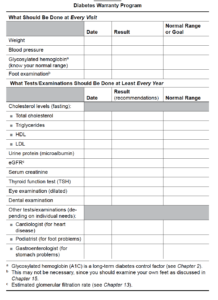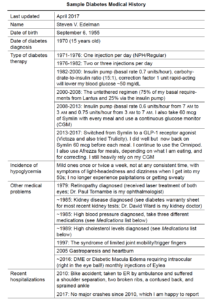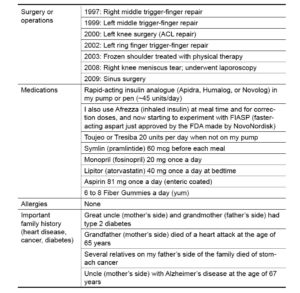
What Is the Diabetes Warranty Program?
One of the most powerful and simple tools you can use to take control of your diabetes is to follow a diabetes warranty program. The concept is similar to the warranty program for a new or used car. If you follow the regularly scheduled maintenance, your car will run better and last longer. Following a diabetes warranty program will also help you pick up problems early so complications don’t reach end-stage levels. I designed this program to detect, as early as possible, any complications, such as eye, kidney, or nerve disease, that may arise over time.
Remember our first goal is to prevent the onset of any complications in the first place, but the next best thing is to be the first to know about them so early and aggressive therapy can be started ASAP! Eye, kidney, nerve, and heart disease do not have any symptoms in the early stages, which makes screening so important. If you follow the regularly scheduled maintenance program that is recommended by leaders in the field of diabetes, you’ll feel better and live a longer, healthier, and more productive life. Please try not to get overwhelmed with the list of things those of us with diabetes need to do over time, as it can seem daunting. All of this “stuff” will become a normal part of your life, and you will be in better shape in the long run.
All people with diabetes need a maintenance record book or electronic document that lists the recommended tests with dates and results like this:

This information is vital, primarily to those of us with diabetes, and secondarily to our health care providers (HCPs), in order to diagnose and track the common problems that can occur with or without diabetes. In many cases, your record will be more orderly and complete than the one in your medical chart.
If you discover that a test or exam has not been done that is needed in order to comply with your diabetes warranty program, you should discuss this with your HCP and request the test or exam. Phrase your comments and questions constructively and not too aggressively (for example, “Is it possible to please check my cholesterol levels next visit? My last values were done over a year ago, and I am concerned about them.”) You must work with your HCP in order to maintain your health and quality of life. Staying healthy is much easier when preventive measures are taken early, especially with diabetes. Most HCPs will be glad to help with your requests if they are appropriate and reasonable.
It is also not uncommon to change physicians or see specialists from different health care systems, so your record keeping takes on an even greater importance. If you can, it would be very helpful to make a file on your computer so that you can easily update it and print it out for your health care visits and/or bring on a flash drive to input into the EMR (electronic medical records). As a physician who cares for people with diabetes, I love it when my patients keep good records of their medical problems, list of medications, other doctors they see, tests, etc. It helps me take better care of them.
Write Up Your Own Diabetes History Sheet and Keep It Updated
It’s also helpful to have a basic information sheet about your medical history up your own diabetes history sheet. Much of your medical history does not change and is easy to update periodically. You can then bring a copy of your medical history, along with your diabetes warranty program sheet, to any health care professional, such as your dentist, physician, diabetes educator, or pharmacist. It will also allow more time for other important issues during your appointment. I have listed my medical information below as an example.


As you can see, I spilled my guts telling all of my medical problems to the world!
What Should Be Done at Your Office Visits?
The standards of care call for certain things to be done at office visits, including measurement of your weight (I know this may be painful and embarrassing for some of you) and blood pressure (BP), a discussion of your HGM results, your CGM results (if appropriate), and laboratory values. You should have had your blood drawn a few days before your appointment, which makes the visit so much more meaningful. I get pretty frustrated with no recent lab results on my patients, and especially if there are no HGM or CGM data as well. A foot exam may also be in order, especially if you are experiencing a problem or have loss of sensation (neuropathy).
As is true with all official recommendations, certain items may not be as pertinent in your case. For example, if you examine your own feet and have no current problems, this part of your office visit is not necessary and not a good use of the limited time you have with your HCP. In addition, if you have a BP device and take your own readings at home, these numbers are more meaningful than a sporadic measurement at the doctor’s office. This is especially true if you have “white coat” phenomenon—your BP goes up when you get it measured at the doctor’s office.
What Tests or Exams Should Be Done at Least Annually?
Certain tests and exams must be done every year in order to initiate aggressive therapy when needed to avoid the end-stage complications of diabetes. A yearly cholesterol panel, a test of how your kidneys have been affected by diabetes, and thyroid levels are a few of the important ones. The yearly dilated eye exam is a must for all people with diabetes and, depending on your list of other medical problems, you may need to see a periodontist, cardiologist, podiatrist, stomach specialist, etc, on an annual or more frequent basis.
Summary
In addition to following the diabetes warranty program, you must be knowledgeable about the available tests and be aware of the kinds of therapies available for any abnormality or problem. Knowing your results is one thing, but finding out what to do with them is an important next step. Be as prepared as possible for your health care visits so you can get the most out of those precious moments. This is what taking control of your diabetes is all about!
Additional Resources:


This is really helpful… need a downloadable form !!! Of course, it can easily be created
Anyways, this is a great idea
I love this article because I have always done this and at times ask myself if I’m obsessive. . I have computer records for daily management, doctor and tests etc. it really evolved from so many years and it being so overwhelming to fill out doctor forms from memory. I would get so flustered that the information was not being communicated correctly. Now it’s just a matter of updating regularly and printing it off when needed. I keep an updated copy in my emergency “to-go bag”.
T1 49 years
Tandem Tslim X2 with Dexcom G6
Afrezza
Wow, Joanne, that is awesome! You are so on top of it! Thank you for sharing what works for you! 🙂
I tried to copy and paste this article into a word document, but the tables are not legible when I do this. Is there any way someone can send this article to me in an email that I can save as a readable Word or PDF document?
Hi Sue,
Yes, I’d be happy to! Will email you shortly. 🙂
I would like a copy emailed to me too please.
Will do! 🙂
Hi Lynne, could you please email me a copy of the diabetes warranty program & the history form too? Thank you!
Of course! The email address that is showing up for you on my end isn’t clear though – please shoot me an email at lynne@tcoyd.org and I’ll forward the info from there. Thanks!
Lynne, please could you email it to me also?
Yes, no problem!
I recently found this online information and find it to be most interesting for me especially since I am a Type 2 Diabetic. Could you be so kind to email me a copy of this diabetes warranty program and whatever you would deem necessary to correctly us this program?
Hi Ersa,
I would be happy to! If you don’t mind, please email me at lynne@tcoyd.org and I can forward it on to you from there. 🙂